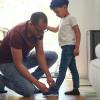
Psst! Pssssst! Yes, you, the parent looking like a deer caught in the headlights of your child’s curiosity, fervently wishing you’d paid more attention during fifth-grade science class. This might be hard to believe, but you can drop the burden of pretending to know everything and relax — your kids will still love you if you don’t have all the answers. It’s actually better for them if you come clean and say, “I don’t know” once in a while.
My son’s daily questions seem to multiply exponentially in number and complexity as he gets older (and he’s only 4!). At first, these questions were easy to answer: “What’s that, Mama?” (A dog.), “Who’s that, Mama?” (The mail carrier.). But lately I’m starting to feel like I’m on a perpetual quiz show, sweating in the spotlight and fielding a rapid volley of obscure inquiries: “What is that [random piece of construction equipment] called?” “Can wapses [sic] sting when they’re dead?” “What is the airspeed velocity of an unladen swallow?” (Well, I haven’t fielded that last one yet, but it’s only a matter of time.)
At first, I grasped at more and more straws to satisfy him (and my ego), but when I caught myself using the classic, “Look, over there!” misdirection trick so I could Google an answer on the sly, I realized that I’m an actor in an untenable charade. I’ve never possessed the type of brain that files away facts and statistics (at least not accurately), and even though making stuff up might help me save face on the spot, I’ve come to believe that it does my son a huge disservice in the long run.
A good friend of mine made it to adolescence believing that the colored position lights on night-flying aircraft meant that they were “police planes,” because that’s what his dad told him. I cringe to think of the roasting he must have eventually suffered over that one. Recently, I was guilty of calling a dump truck with a pony trailer a “double dump.” My son passionately argued with my husband (who used to build said trailers for a living) for 10 minutes straight, saying, “No, Papa! Mama says it’s a double dump!” as I sank lower in my seat.
Continuing to improve and model my own research, critical thinking, and print and media literacy skills in front of and with my son will help him learn good information habits.
Apart from saving my son any future embarrassment, I also want to avoid perpetuating the mythic expectation that “facts equal smarts.” When I taught elementary school, I witnessed countless students who were whizzes with computation fall apart when confronted with more complex problems that required strategizing. Some kids spell perfectly yet struggle profoundly to put their thoughts on paper. There are also students who can decode words and read aloud with astonishing fluency, yet have little to no comprehension of what they read.
“Learning how to learn” — i.e., building a personal toolkit of problem-solving strategies, fostering a growth mindset and honing critical thinking skills — seems far more important to future success than being able to recite the nine times table or name all the U.S. presidents in order. Facts are useful, and certainly save time if they are at the tip of your tongue, but if you don’t know what to do with those facts or how to put knowledge into practice, then you’re kind of stuck.
I don’t want my son to think that learning something is always as simple as asking someone else or looking at the first result in a Google search — some degree of struggle is often part of the process of learning. Seeing me honestly work through my frustration when I can’t easily find an answer shows him a growth mindset in action: Our knowledge and abilities can continuously evolve and improve if we use effective strategies and reflection.
We live in a world that is glutted with facts (and, worryingly, “alternative facts”). Sifting through the deluge of useless, conflicting and sometimes downright dodgy information floating around in order to discern what’s reliable has become an increasingly time-consuming (and necessary) practice.
Continuing to improve and model my own research, critical thinking, and print and media literacy skills in front of and with my son will help him learn good information-seeking habits. He’s already witnessed me talking myself through websites: “Who wrote this? What is the date on this? Hmmm, that’s interesting, but I should check another source to make sure…”
Some answers aren’t easy to reach, and some questions don’t have one clearly defined answer. There are mysteries we can (and should) wrestle with throughout our lives — these are ongoing quests that help us develop our skills and deepen our insight and understanding.
So even though I would love to consistently live up to my son’s belief that I know everything, I think the wisest course of action (most of the time) is to admit my ignorance. Now, when he asks me something that I don’t know the answer to, I’m honest: “Actually, I don’t know that. Let’s find out together.”











